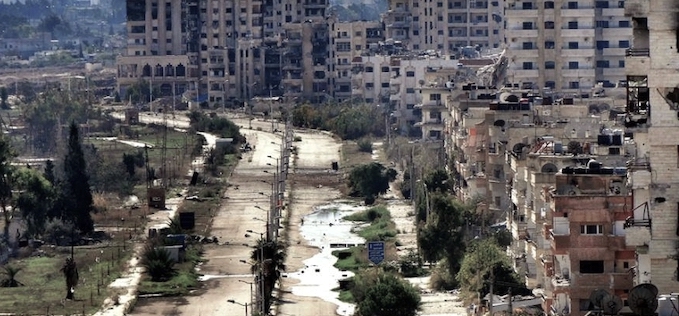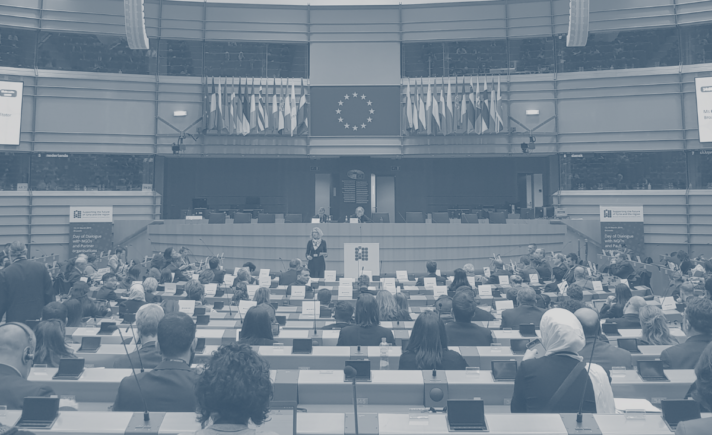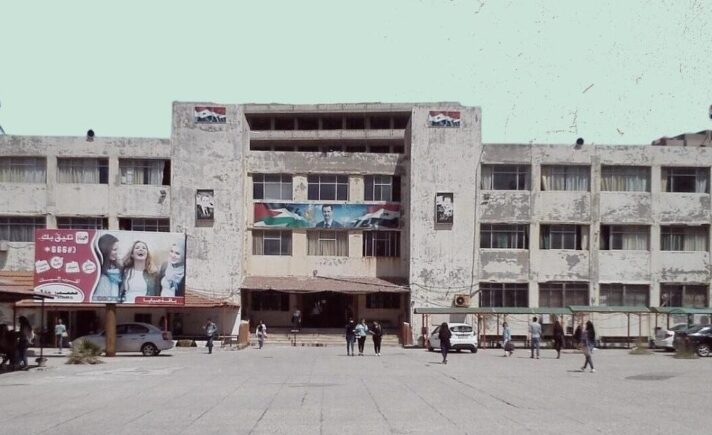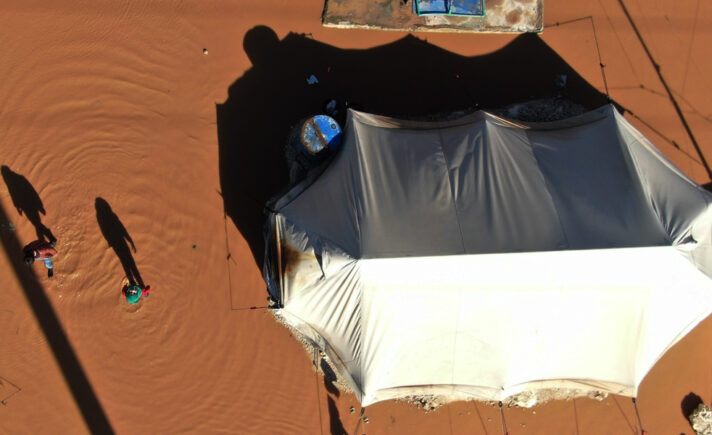[Editor’s note: This article was produced as part of Al-Jumhuriya’s Fellowship for Young Writers. It was originally published in Arabic on 19 December, 2018]
When I found myself that day on a bus with my colleagues, en route to a pro-regime parade, I felt I’d been broken in half. One half belonged in the past, when I lived besieged in Homs’ al-Wa’r neighborhood before it fell into the hands of the regime. The other belongs in the here and now, as I stand amid a large crowd of people chanting, “Long live the President,” and brandishing flags to greet the governor’s convoy, which always makes an appearance at the forefront of such “patriotic celebrations” reaffirming allegiance to the leader. Who am I? Where am I? All I knew was I had lost my way, and should have taken the green buses north to Idlib Province, however harsh and uncertain the journey would have been.
I see a friend prancing and chanting for the Father-Leader, and ask her how she can do it after losing her father to the dark abyss of prison. She says she just wants to live, that she’s tired of war, and has had enough. The red flag waves high, like a river of viscous blood flowing in the air. I almost collapse as I watch the motion of the flags dancing in the hands of their bearers. I leave the march and go back home, turning to look at the rivers of blood hanging on the walls along the way, recalling what had happened during the first months since I left al-Wa’r for Old Homs.
1.
A blind man stumbles more than once while walking, despite the stick he’s waving in front of him. When he almost crosses the road in front of a speeding car, I sprint towards him and pull him by his shirt, shouting, “Watch out, a car!” His half-closed eyelids with thick eyelashes dance, and his face fills with joy at a woman walking beside him. He was a young man in his early thirties, and I was a woman in high heels walking beside a blind man, guiding him to a destination he couldn’t clearly explain as he didn’t really know where he was, being someone from a nearby village known to be populated by Shia Muslims, and to be a stronghold of Hezbollah.
The man had no way of knowing I hailed from a place where his life would have been in danger had he stepped foot there not so long ago. Nor would he have known that, walking together, we were a spectacle for onlookers. The few men on the street who had abdicated the responsibility to help him preferred to give me sinister looks as I, at one moment, had to grab him by the arm to protect him from a speeding motorbike. Smiling and looking up, he told me he’d left his wife in the village, leaving her at home with their two children. He then mentioned a man who was supposed to help him with either a job or some financial aid. He produced an old piece of paper from his pocket, and asked me with embarrassment to call the number written on it.
When I did, a gruff male voice answered, grim and piercing, like those of the regime forces at the al-Wa’r checkpoint who put the neighborhood’s residents through such humiliation for years. I handed my phone to the blind man, who seemed at that moment as if from another world, and I listened to him speak with utmost reverence to the man with the abhorrent voice on the other end. I never thought I would ever walk a blind man to his destination, least of all on the first time I walk in the city after an absence of over two years. I’d been living in al-Wa’r for years, and having just left it, I was overwhelmed, burdened with everything that had happened there. I was a bit like that blind man, walking without knowing where I was going, only in my case there was no one rushing over to show me.
2.
In 2015, a man gave me a pistol wrapped in old cloth, during what was known as the “Salt Siege.” I felt at the time like I was in a scene of a film with an unhappy ending. He asked me to look after it and hide it, and gave me a few bullets. He said it was needed for personal protection in al-Wa’r, and could be necessary if a thief came to steal our aid provisions or LED batteries, or if the army entered the neighborhood without warning. At first, I hid it below my bed for a few weeks, but then I put it on a random shelf, because I’d forgotten about it and never needed it. The sense of security in the neighborhood made the pistol akin to a precious antique, hidden among clothes at the bottom of the closet, like in the Bab al-Hara TV series, except with rather more sincerity and realism, and less fantasy.
Shortly before the army entered the neighborhood, the pistol’s owner had died, or perhaps was martyred, or had departed our world—the choice of words to describe death was no longer important. The gun was now no more than a weighty memory and deposit, with which I had to act fast before it was too late. It was given to a young man studying pharmaceutics who had partially lost his sight, and who was bound for Idlib aboard the green buses. He promised to safeguard the deposit upon his arrival, though I learned a few weeks ago that he’d moved to Germany, and the gun had ended up somewhere else; in some other pocket; or under some other bed.
This pistol, which I never used, was nothing but an artifact I’d hidden among other mementos tied to the neighborhood. It was never about safety to me, for the safety experienced by the people of al-Wa’r—aside from the shelling, and rockets, and snipers—was bound up with something much dearer and more precious, something for which lives were sacrificed. It’s something I and many others who lived there now sorely miss, whether they moved to the Homs city center after the regime takeover or not. We feel its loss particularly when passing a checkpoint, or a soldier, or a car with tinted windows, or a man displaying his pistol, or when we hear the doorbell late at night, or a member of the family is late coming home. Those here in the city center may scoff when we talk about this fear, because they’re used to it, or because the fitna (“sedition”) is over, and the country’s secure once more, and the “state” wants safety for all. There’s no need to worry anymore, as Homs has been “liberated from terrorism,” even if it “paid a lot” for it, as they say.
3.
By the time the army entered al-Wa’r, parents had already taught their children what to say and what to keep quiet about. It’s amazing how capable children can be of lying, compared with their capacity for sincerity. These aren’t the ordinary falsehoods of children’s imagination, but rather those arising from their ability to understand their parents’ fear and adapt accordingly to new realities as quickly as they arrive. Those who can withstand barrel bombs, airstrikes, and siege, can withstand being face-to-face with those responsible for these hardships. The children saw everything, and heard everything that was said. They know exactly what happened. They know how they were transferred from one shore to another, from one person’s grip to another’s. They know the meaning of being under the control of either side, and the boundaries permitted in both cases. They have no trouble learning from relatives the hypocrisy required to stay composed when the army enters their homes for inspection or surveys, or when they pass through a checkpoint, or even when they enter a public school.
The child I saw one day painting the flag of the revolution in watercolors on a wall near his home is the same one who now draws the regime flags on his notebooks and wears it as a fabric bracelet round his wrist. The child who had once memorized the songs sung by the iconic protest leader Abdul Basit Sarout is the same one who now bellows “patriotic” songs glorifying the president.
I could never have believed I’d be a part of this some day, or that I would join one teacher in tearing and burning all the drawings done by the children, which were the most beautiful things ever drawn by al-Wa’r’s children, and which the teacher had forgotten to destroy along with the rest of the evidence. In those drawings, the children told with their own eyes and hands the truth of what happened, away from the adults’ prattle and exaggerations. The drawings told of blood and death, and fear, and the postponed hope that is now as good as dead.
On that evening, a few days after the army’s entry into al-Wa’r, my feet led me to the main street, as I searched for fresh air away from the smoke emanating from the burning memories of al-Wa’r; that smoke known to all who remained in the neighborhood and never left it. That evening, a group of children gathered in front of an army checkpoint, forming a small circle around the soldiers, cheering and saluting them, then crying out the old chant, “With our soul, with our blood, we sacrifice ourselves for you, Bashar.”
They were laughing; laughing a lot; laughing hysterically. As for the soldiers, with their scowls, they knew perfectly well that these children now chanting in adoration were just yesterday shouting against them, and that no one knew in whose honor they’d be chanting tomorrow.
4.
We’ve not yet arrived at Judgment Day, but already here the brother may flee from his brother, or the father from his son or daughter, if anyone is suspected of anything.
I don’t know you, and you never knew me. We’re now in the embrace of the homeland, and the homeland can’t withstand the weight of an acquaintance that may have been formed in a bomb shelter one day, in a tiny basement barely able to accommodate the people of the building and the neighboring ones. I don’t know you, nor do you know me, even if we exchanged loaves of bread made from unthinkable ingredients; even if we worked together; or gave condolences to one another at funerals; or attended weddings held over a cup of coffee, shedding a tear of joy at the sight of the bride in white amidst all the destruction.
When I saw him for the first time, I was shocked. The young man had belonged to one of the major rebel factions, working for them as an electrician. Now he works at a small grocery. I know his wife and two children, and I know he was wanted by the regime. He now sells biscuits, rice, and spices. Here, there was no possibility of turning heads away. “Welcome, madam,” he said, then gave me my goods in a hurry, smiling confidentially.
He’s one of hundreds who have “settled their status” and relocated to what we who belong to the other world used to call Old Homs. One sometimes hears people priding in having “settled” in this manner, though most avoid mentioning it. What’s beyond doubt is that most young men of military age, or those who knew they were wanted by the regime, would never have returned to the warm embrace of the homeland without such settlements, and receipt of their “no-longer-wanted” papers, which mean they’re no longer being pursued by the security apparatus. This took place immediately after the rebel fighters left the neighborhood. The precious “no-longer-wanted” paper was like a passport to the “paradise of Old Homs.” One of my friends boasted about her husband being one of the first to settle his status, and how his paper arrived just two weeks after he applied, and how, on the evening he received it, the two of them strolled together through the neighborhoods of the old city, after five years away from it.
But the story doesn’t end there, for many of these men were in fact conscripted into the army’s reserve force, or are waiting on the reserve list, as it’s known. Others don’t dare move meters from their homes, knowing they’ll be whisked straight away for reserve service. One even took up the tasks of cooking and caring for the children at home, while his wife works ten-hour shifts to put food on the table. As for those who fought militarily against the regime in the neighborhood, and then settled, their fates vary according to their previous roles. A not-insignificant number disappeared suddenly without anyone daring to inquire as to their whereabouts.
What truly breaks the heart, however, isn’t those who pretend not to know me, who I in turn pretend not to recognize, but rather those who look like others who left for the north. My heart skips a beat when I see them, and I confuse the faces, believing for a second that they’re still here, and rush to greet them, breaking the rule of this false Judgment Day, only to discover that I was wrong, and that my eyes no longer recognize faces.
5.
We’re now in the month of Ramadan, and a year has passed since the “cleansing” of al-Wa’r. I ride a taxi to the old city. The fifty-something driver smiles excessively when I try to bargain a fare with him, saying, “it doesn’t matter.” He then introduces himself to me with a mirthless smile, telling me he works in Air Force Intelligence. I stammer, and choke on the phrase “nice to meet you.” He speaks confidently about the role of “the leadership” in restoring security to the country, pausing for a moment and then saying the religious clerics are to blame for what happened, for inciting the people to fitna despite the fact “the leadership” extended them a conciliatory hand from the start. The clergy, he says, are always “the root of all woes”.
I nod my head in due hypocritical agreement, and I look at his hands, imagining what he’s committed with them. I suppose he told me his real profession as a way of boasting. Or maybe this is part of the “breaking of heads” policy followed to such excess in this town. Huge numbers of people have grown accustomed to casual intimidation of this kind, and identify with it in a manner not unlike other countries that have gone through wars and revolutions. All that is rotten rises to the surface, and the villains turn yet more selfish and cruel as a result of the war.
When I reach the old city, the driver hands me a paper with his number written on it, and says to call him if I ever need a ride. I take it and keep it for emergencies, for who knows what could happen in this wonderland we inhabit?
I walk across a large park in the center of the city, and see five girls sitting on the grass, smoking hookah and listening to music. A crowd gathers round them, watching the girls with their uncovered heads, staring in a curious and irritated way. We in the city are used to seeing people not fasting in Ramadan—this has been the way for years—but this spectacle went beyond that; beyond the religious significance of it; beyond the matter of personal liberties regarding the right to fast or not.
The whole scene, instead, seemed like an expression of the general state of defeat lived by a wide spectrum of the city’s population, who find themselves pulverized today by the tyranny of the triumphant party, against which they revolted years ago. The girls in the park represented that victor in spite of themselves, and regardless of whatever they were thinking at the time.
6.
At the newly-renovated “President Roundabout,” many young men and women gather to take selfies amid the decoration and illumination, with the statue of the Father-Leader as an iron background. Some ask the soldier standing near the statue to help them capture this historic photo.
Here, truth often gets jumbled in this other world, the world of defeat, of hypocrisy, of salt poured into wounds, and of the enormous losses that have brought so many lives to a standstill, rendering people both living and dead, bereft of the compass by which we thought we navigated when everything was clear.
Any distinction between the past of the city at the height of its revolution and what has now become of it soon dissipates. What remains is a very sharp, very deep schism within everyone who lived through the states of revolution and defeat, before finally collapsing in the poisonous Embrace of the Homeland. Here, you find the most extreme opinions and inclinations, between those who blindly follow the footsteps of their executioner, and those trying to dance on more than one tightrope, if only to persuade themselves they still stand against injustice despite all their hypocrisy.
Many here, in a moment of candor, find themselves fluctuating between two worlds: the revolutionary world engraved in the soul and memory; and the other world, characterized by phrases like “it’s over” and words like fitna that mask the truth. The truth is known to all and feared by all, appearing only at moments of revelation, like the secret funerals held for those killed by torture in prison. No, it is not forgetfulness, nor tacit acceptance, but the sheer might of the oppressor, which, should it ever diminish, even slightly, things will return as they were, and the bloody red flags will lower their heads in shame at what has happened.





